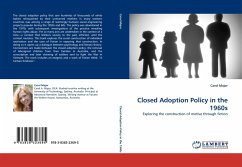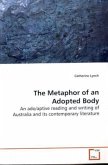The closed adoption policy that saw hundreds of thousands of white babies relinquished by their unmarried mothers in many western countries was among a range of seemingly humane social engineering projects popular during the 1950s and 60s. The policy was abandoned in the 1970s with subsequent investigations of the practice revealing human rights abuse. Yet so many acts are undertaken in the context of a time-a context that blinkers society to the pain inflicted, until the context mutates. This book explores the social construction of individual motivation and the uses of fiction in exposing that construction. In doing so it opens up a dialogue between psychology and literary theory. Connections are made between the closed adoption policy, the removal of Aboriginal children from their families in Australia, and the conscription and later shaming of soldiers sent to fight the War in Vietnam. The work includes an exegesis and a work of fiction titled, "A Certain Kindness".
Bitte wählen Sie Ihr Anliegen aus.
Rechnungen
Retourenschein anfordern
Bestellstatus
Storno








